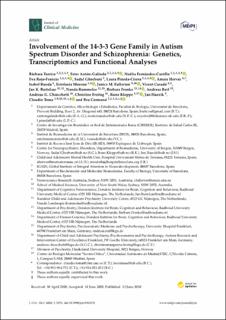| dc.contributor.author | Torrico, Bàrbara | |
| dc.contributor.author | Antón-Galindo, Ester | |
| dc.contributor.author | Fernàndez-Castillo, Noèlia | |
| dc.contributor.author | Rojo-Francàs, Eva | |
| dc.contributor.author | Ghorbani, Sadaf | |
| dc.contributor.author | Pineda-Cirera, Laura | |
| dc.contributor.author | Hervas, Amaia | |
| dc.contributor.author | Rueda, Isabel | |
| dc.contributor.author | Moreno, Estefanía | |
| dc.contributor.author | Fullerton, Janice M. | |
| dc.contributor.author | Casadó, Vicent | |
| dc.contributor.author | Buitelaar, Jan K | |
| dc.contributor.author | Rommelse, Nanda | |
| dc.contributor.author | Franke, Barbara | |
| dc.contributor.author | Reif, Andreas | |
| dc.contributor.author | Chiocchetti, Andreas G | |
| dc.contributor.author | Freitag, Christine | |
| dc.contributor.author | Kleppe, Rune | |
| dc.contributor.author | Haavik, Jan | |
| dc.contributor.author | Toma, Claudio | |
| dc.contributor.author | Cormand, Bru | |
| dc.date.accessioned | 2021-06-14T13:00:02Z | |
| dc.date.available | 2021-06-14T13:00:02Z | |
| dc.date.created | 2021-02-12T13:30:16Z | |
| dc.date.issued | 2020 | |
| dc.identifier.issn | 2077-0383 | |
| dc.identifier.uri | https://hdl.handle.net/11250/2759346 | |
| dc.description.abstract | The 14-3-3 protein family are molecular chaperones involved in several biological functions and neurological diseases. We previously pinpointed YWHAZ (encoding 14-3-3ζ) as a candidate gene for autism spectrum disorder (ASD) through a whole-exome sequencing study, which identified a frameshift variant within the gene (c.659-660insT, p.L220Ffs*18). Here, we explored the contribution of the seven human 14-3-3 family members in ASD and other psychiatric disorders by investigating the: (i) functional impact of the 14-3-3ζ mutation p.L220Ffs*18 by assessing solubility, target binding and dimerization; (ii) contribution of common risk variants in 14-3-3 genes to ASD and additional psychiatric disorders; (iii) burden of rare variants in ASD and schizophrenia; and iv) 14-3-3 gene expression using ASD and schizophrenia transcriptomic data. We found that the mutant 14-3-3ζ protein had decreased solubility and lost its ability to form heterodimers and bind to its target tyrosine hydroxylase. Gene-based analyses using publicly available datasets revealed that common variants in YWHAE contribute to schizophrenia (p = 6.6 × 10−7), whereas ultra-rare variants were found enriched in ASD across the 14-3-3 genes (p = 0.017) and in schizophrenia for YWHAZ (meta-p = 0.017). Furthermore, expression of 14-3-3 genes was altered in post-mortem brains of ASD and schizophrenia patients. Our study supports a role for the 14-3-3 family in ASD and schizophrenia. | en_US |
| dc.language.iso | eng | en_US |
| dc.publisher | MDPI | en_US |
| dc.rights | Navngivelse 4.0 Internasjonal | * |
| dc.rights.uri | http://creativecommons.org/licenses/by/4.0/deed.no | * |
| dc.title | Involvement of the 14-3-3 Gene Family in Autism Spectrum Disorder and Schizophrenia: Genetics, Transcriptomics and Functional Analyses | en_US |
| dc.type | Journal article | en_US |
| dc.type | Peer reviewed | en_US |
| dc.description.version | publishedVersion | en_US |
| dc.rights.holder | Copyright 2020 by the authors | en_US |
| dc.source.articlenumber | 1851 | en_US |
| cristin.ispublished | true | |
| cristin.fulltext | original | |
| cristin.qualitycode | 1 | |
| dc.identifier.doi | 10.3390/jcm9061851 | |
| dc.identifier.cristin | 1889199 | |
| dc.source.journal | Journal of Clinical Medicine | en_US |
| dc.relation.project | EC/H2020/643051 | en_US |
| dc.relation.project | EC/H2020/667302 | en_US |
| dc.identifier.citation | Journal of Clinical Medicine. 2020, 9 (6), 1851. | en_US |
| dc.source.volume | 9 | en_US |
| dc.source.issue | 6 | en_US |

